Hexagramme 47 du Yi Jing - Trait 3
L'hexagramme : 47
Un hexagramme est une combinaison de six traits yin et yang.

47.3 (47 > 28) - THE KHWĂN HEXAGRAM.
The third line, divided, shows its subject straitened before a (frowning) rock. He lays hold of thorns. He enters his palace, and does not see his wife. There will be evil.
Bing DeepL Google Yandex47.3 (47 > 28) - Being demoralised
One loses one' s means so one must ask for help from those whom one had neglected.
Bing DeepL Google Yandex47.3 (47 > 28) - Being demoralized
One loses one' s means so one must ask for help from those whom one had neglected.
Bing DeepL Google Yandex47.3 (47 > 28) - K’uán, la détresse
K’uán : détresse, abattement, dureté, sévérité, mauvais traitements.
Serré contre un rocher, poignant (pour se soutenir) dans des buissons pleins de grosses épines, ou rentrant dans sa maison et n’y trouvant pas sa femme (enlevée par des brigands). [Cas douloureux, mauvaise fortune. Com. II.]
Bing DeepL Google Yandex47.3 (47 > 28) - Être démoralisé
On perd ses moyens alors on doit demander de l'aide à ceux que l'on avait négligé.
Bing DeepL Google Yandex47.3 (47 > 28) - Kényelmetlenség
Elveszti az ítélőképességét, így meg kell kérnie azokat, akiket figyelmen kívül hagyott, hogy segítsenek.
Bing DeepL Google YandexLes trigrammes
Les trigrammes sont des combinaisons de trois traits yin et yang. Dans l'hexagramme, les trois traits du dessous constituent le trigramme inférieur et représentent la situation intérieure. Les trois lignes du haut constituent le trigramme supérieur et représentent la situation extérieure.
trigSup

Trigramme inférieur : L'eau Le vent


L'hexagramme nucléaire : 37.2.4 (37 > 1)
L'hexagramme nucléaire est l'association des deux trigrammes intérieurs (traits 2,3,4 et 3,4,5). Il représente la racine, ou l'origine de la situation.

37.2.4 (37 > 1) - THE KIÂ ZĂN HEXAGRAM.
- 2. The second line, divided, shows its subject taking nothing on herself, but in her central place attending to the preparation of the food. Through her firm correctness there will be good fortune.
- 4. The fourth line, divided, shows its subject enriching the family. There will be great good fortune.
37.2.4 (37 > 1) - Correcting rounding errors
One can take as example those who have tried.
Bing DeepL Google Yandex37.2.4 (37 > 1) - Correcting rounding errors
One can take as example those who have tried.
Bing DeepL Google Yandex37.2.4 (37 > 1) - Kia, la parenté, le clan
Kiā : famille, maison.
-
2. Si l’on n’a pas besoin d’aller au-dehors, mais que les provisions soient accumulées dans l’intérieur de la maison, elle sera prospère.
Il faut douceur dans la prospérité. -
4. Pourvoir abondamment sa maison est une assurance de grands succès.
Ce sera quand la complaisance (des chefs) et la docilité (des subordonnés) seront en leur lieu.
37.2.4 (37 > 1) - Corriger les erreurs d'arrondi
On peut prendre en exemple ceux qui ont essayé.
Bing DeepL Google Yandex37.2.4 (37 > 1) - Rokonok
- 2. Nem választja a hozzá nem értőt.
- 4. Csak azt veszi meg amire szükség van.
Le dérivé (Fan Yao) : 28.3
Le même trait sur l'hexagramme après la mutation. Il représente ce qui peut être fait APRÈS pour corriger la situation décrite par ce trait, un peu comme un remède ou une solution.

28.3 (28 > 47) - THE TÂ KWO HEXAGRAM.
The third line, undivided, shows a beam that is weak. There will be evil.
Bing DeepL Google Yandex28.3 (28 > 47) - Tá kvoh, le grand excès
Tá kvoh : 1. Grand excès, défaut, manquement ; 2. Traverser, dépasser.
Une poutre, un pilier trop faible (voir texte I) sont mauvais (ils ne peuvent supporter) (grand défaut).
Bing DeepL Google YandexLa jointure: 28.4
Le dérivé du réciproque. Il représente ce qui aurait pu être fait AVANT pour prévenir la situation décrite par ce trait, un peu comme un remède ou une solution.

28.4 (28 > 48) - THE TÂ KWO HEXAGRAM.
The fourth line, undivided, shows a beam curving upwards. There will be good fortune. If (the subject of it) looks for other (help but that of line one), there will be cause for regret.
Bing DeepL Google Yandex28.4 (28 > 48) - Being weakened
One is supported by others but needs to recover.
Bing DeepL Google Yandex28.4 (28 > 48) - Being weakened
One is supported by others but needs to recover.
Bing DeepL Google Yandex28.4 (28 > 48) - Tá kvoh, le grand excès
Tá kvoh : 1. Grand excès, défaut, manquement ; 2. Traverser, dépasser.
Une colonne haute et forte est bonne ; toute autre est dangereuse (opposition à ce qui précède)
Bing DeepL Google Yandex28.4 (28 > 48) - Être affaibli
On a le soutien des autres mais on a besoin de récupérer.
Bing DeepL Google YandexLe réciproque : 48.4
L'hexagramme renversé. Il représente la situation opposée, et en tant que tel est essentiel pour la validation des commentaires.

48.4 (48 > 28) - THE 3INGHEXAGRAM.
The fourth line, divided, shows a well,the lining of which is well laid. There will be no error.
Bing DeepL Google Yandex48.4 (48 > 28) - Returning to the source
One has paused to replenish the reserves.
Bing DeepL Google Yandex48.4 (48 > 28) - Returning to the source
One has paused to replenish the reserves.
Bing DeepL Google Yandex48.4 (48 > 28) - Tsing, le puits
Tsing : puits.
Un puits bien construit, citerné, est une chose de haute utilité.
Bing DeepL Google Yandex48.4 (48 > 28) - Retourner à la source
On a fait une pause pour reconstituer les réserves.
Bing DeepL Google YandexMutations

47.3 (47 > 28) - THE KHWĂN HEXAGRAM.
The third line, divided, shows its subject straitened before a (frowning) rock. He lays hold of thorns. He enters his palace, and does not see his wife. There will be evil.
Bing DeepL Google Yandex47.3 (47 > 28) - Being demoralised
One loses one' s means so one must ask for help from those whom one had neglected.
Bing DeepL Google Yandex47.3 (47 > 28) - Being demoralized
One loses one' s means so one must ask for help from those whom one had neglected.
Bing DeepL Google Yandex47.3 (47 > 28) - K’uán, la détresse
K’uán : détresse, abattement, dureté, sévérité, mauvais traitements.
Serré contre un rocher, poignant (pour se soutenir) dans des buissons pleins de grosses épines, ou rentrant dans sa maison et n’y trouvant pas sa femme (enlevée par des brigands). [Cas douloureux, mauvaise fortune. Com. II.]
Bing DeepL Google Yandex47.3 (47 > 28) - Être démoralisé
On perd ses moyens alors on doit demander de l'aide à ceux que l'on avait négligé.
Bing DeepL Google Yandex47.3 (47 > 28) - Kényelmetlenség
Elveszti az ítélőképességét, így meg kell kérnie azokat, akiket figyelmen kívül hagyott, hogy segítsenek.
Bing DeepL Google Yandex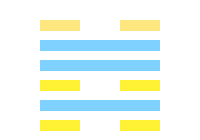
47.1.3 (47 > 43) - THE KHWĂN HEXAGRAM.
- 1. The first line, divided, shows its subject with bare buttocks straitened under the stump of a tree. He enters a dark valley, and for three years has no prospect (of deliverance).
- 3. The third line, divided, shows its subject straitened before a (frowning) rock. He lays hold of thorns. He enters his palace, and does not see his wife. There will be evil.
47.1.3 (47 > 43) - The embarrassment
One is repeating the same mistake despite the good advice one received.
Bing DeepL Google Yandex47.1.3 (47 > 43) - The embarrassment
One is repeating the same mistake despite the good advice one received.
Bing DeepL Google Yandex47.1.3 (47 > 43) - K’uán, la détresse
K’uán : détresse, abattement, dureté, sévérité, mauvais traitements.
- 1. Un homme pressé contre le pied d’un arbre, poussé dans une caverne obscure, ne pouvant pendant très longtemps (litt. : 3 ans) voir personne à qui recourir.
- 3. Serré contre un rocher, poignant (pour se soutenir) dans des buissons pleins de grosses épines, ou rentrant dans sa maison et n’y trouvant pas sa femme (enlevée par des brigands). [Cas douloureux, mauvaise fortune. Com. II.]
47.1.3 (47 > 43) - La gêne
On refait encore la même erreur malgré les bons conseils que l'on a reçu.
Bing DeepL Google Yandex47.1.3 (47 > 43) - Kényelmetlenség
- 1. Felhagy az ügyeivel egy időre mert nem látni semmit.
- 3. Elveszti az ítélőképességét, így meg kell kérnie azokat, akiket figyelmen kívül hagyott, hogy segítsenek.

47.2.3 (47 > 31) - THE KHWĂN HEXAGRAM.
- 2. The second line, undivided, shows its subject straitened amidst his wine and viands. There come to him anon the red knee-covers (of the ruler). It will be well for him (to maintain his sincerity as) in sacrificing. Active operations (on his part) will lead to evil, but he will be free from blame.
- 3. The third line, divided, shows its subject straitened before a (frowning) rock. He lays hold of thorns. He enters his palace, and does not see his wife. There will be evil.
47.2.3 (47 > 31) - The embarrassment
One is a tough cookie, so one is not afraid of a few scratches.
Bing DeepL Google Yandex47.2.3 (47 > 31) - The embarrassment
One is a tough cookie, so one is not afraid of a few scratches.
Bing DeepL Google Yandex47.2.3 (47 > 31) - K’uán, la détresse
K’uán : détresse, abattement, dureté, sévérité, mauvais traitements.
- 2. Cet homme est dans la détresse quant au boire et au manger. Mais tout à coup apparaît la couverture rouge (du char du roi) (ou le secours), il est délivré, il pourra offrir des dons et sacrifices, il châtiera les méchants sans éprouver de dommage. [La ferme droiture est digne d’éloges. Com. II.] L’arrivée du roi ou des gens le sauve.
- 3. Serré contre un rocher, poignant (pour se soutenir) dans des buissons pleins de grosses épines, ou rentrant dans sa maison et n’y trouvant pas sa femme (enlevée par des brigands). [Cas douloureux, mauvaise fortune. Com. II.]
47.2.3 (47 > 31) - La gêne
On est un dur à cuire alors on ne craint pas quelques égratignures.
Bing DeepL Google Yandex47.2.3 (47 > 31) - Kényelmetlenség
- 2. Nem vár semmit, amikor egy váratlan látogató lehetővé teszi hogy felülvizsgálja ítéleteit.
- 3. Elveszti az ítélőképességét, így meg kell kérnie azokat, akiket figyelmen kívül hagyott, hogy segítsenek.

47.1.2.3 (47 > 49) - THE KHWĂN HEXAGRAM.
- 1. The first line, divided, shows its subject with bare buttocks straitened under the stump of a tree. He enters a dark valley, and for three years has no prospect (of deliverance).
- 2. The second line, undivided, shows its subject straitened amidst his wine and viands. There come to him anon the red knee-covers (of the ruler). It will be well for him (to maintain his sincerity as) in sacrificing. Active operations (on his part) will lead to evil, but he will be free from blame.
- 3. The third line, divided, shows its subject straitened before a (frowning) rock. He lays hold of thorns. He enters his palace, and does not see his wife. There will be evil.
47.1.2.3 (47 > 49) - The embarrassment
One finally gets by because the others have found a less tough prey.
Bing DeepL Google Yandex47.1.2.3 (47 > 49) - The embarrassment
One finally gets by because the others have found a less tough prey.
Bing DeepL Google Yandex47.1.2.3 (47 > 49) - K’uán, la détresse
K’uán : détresse, abattement, dureté, sévérité, mauvais traitements.
- 1. Un homme pressé contre le pied d’un arbre, poussé dans une caverne obscure, ne pouvant pendant très longtemps (litt. : 3 ans) voir personne à qui recourir.
- 2. Cet homme est dans la détresse quant au boire et au manger. Mais tout à coup apparaît la couverture rouge (du char du roi) (ou le secours), il est délivré, il pourra offrir des dons et sacrifices, il châtiera les méchants sans éprouver de dommage. [La ferme droiture est digne d’éloges. Com. II.] L’arrivée du roi ou des gens le sauve.
- 3. Serré contre un rocher, poignant (pour se soutenir) dans des buissons pleins de grosses épines, ou rentrant dans sa maison et n’y trouvant pas sa femme (enlevée par des brigands). [Cas douloureux, mauvaise fortune. Com. II.]
47.1.2.3 (47 > 49) - La gêne
On finit par s'en sortir car les autres ont trouvé une proie moins coriace.
Bing DeepL Google Yandex47.1.2.3 (47 > 49) - Kényelmetlenség
- 1. Felhagy az ügyeivel egy időre mert nem látni semmit.
- 2. Nem vár semmit, amikor egy váratlan látogató lehetővé teszi hogy felülvizsgálja ítéleteit.
- 3. Elveszti az ítélőképességét, így meg kell kérnie azokat, akiket figyelmen kívül hagyott, hogy segítsenek.

47.3.4 (47 > 48) - THE KHWĂN HEXAGRAM.
- 3. The third line, divided, shows its subject straitened before a (frowning) rock. He lays hold of thorns. He enters his palace, and does not see his wife. There will be evil.
- 4. The fourth line, undivided, shows its subject proceeding very slowly (to help the subject of the first line), who is straitened by the carriage adorned with metal in front of him. There will be occasion for regret, but the end will be good.
47.3.4 (47 > 48) - Making a strong impression
One looks at one's opponents scornfully to show them that one is not intimidated.
Bing DeepL Google Yandex47.3.4 (47 > 48) - Making a strong impression
One looks at one's opponents scornfully to show them that one is not intimidated.
Bing DeepL Google Yandex47.3.4 (47 > 48) - K’uán, la détresse
K’uán : détresse, abattement, dureté, sévérité, mauvais traitements.
- 3. Serré contre un rocher, poignant (pour se soutenir) dans des buissons pleins de grosses épines, ou rentrant dans sa maison et n’y trouvant pas sa femme (enlevée par des brigands). [Cas douloureux, mauvaise fortune. Com. II.]
- 4. Autre cas). Homme avançant avec précaution, en détresse et quant à l’argent et quant à son char (qu’il a perdu) ; il est en grand danger d’être pris.
47.3.4 (47 > 48) - Faire une forte impression
On toise ses adversaires pour leur montrer que l'on n'est pas intimidé.
Bing DeepL Google Yandex47.3.4 (47 > 48) - Kényelmetlenség
- 3. Elveszti az ítélőképességét, így meg kell kérnie azokat, akiket figyelmen kívül hagyott, hogy segítsenek.
- 4. Mielőtt másokhoz csatlakozna, meg kell felelnie jótevői igényeinek.

47.1.3.4 (47 > 5) - THE KHWĂN HEXAGRAM.
- 1. The first line, divided, shows its subject with bare buttocks straitened under the stump of a tree. He enters a dark valley, and for three years has no prospect (of deliverance).
- 3. The third line, divided, shows its subject straitened before a (frowning) rock. He lays hold of thorns. He enters his palace, and does not see his wife. There will be evil.
- 4. The fourth line, undivided, shows its subject proceeding very slowly (to help the subject of the first line), who is straitened by the carriage adorned with metal in front of him. There will be occasion for regret, but the end will be good.
47.1.3.4 (47 > 5) - The embarrassment
One sends heir friends what they need to be entertained.
Bing DeepL Google Yandex47.1.3.4 (47 > 5) - The embarrassment
One sends heir friends what they need to be entertained.
Bing DeepL Google Yandex47.1.3.4 (47 > 5) - K’uán, la détresse
K’uán : détresse, abattement, dureté, sévérité, mauvais traitements.
- 1. Un homme pressé contre le pied d’un arbre, poussé dans une caverne obscure, ne pouvant pendant très longtemps (litt. : 3 ans) voir personne à qui recourir.
- 3. Serré contre un rocher, poignant (pour se soutenir) dans des buissons pleins de grosses épines, ou rentrant dans sa maison et n’y trouvant pas sa femme (enlevée par des brigands). [Cas douloureux, mauvaise fortune. Com. II.]
- 4. Autre cas). Homme avançant avec précaution, en détresse et quant à l’argent et quant à son char (qu’il a perdu) ; il est en grand danger d’être pris.
47.1.3.4 (47 > 5) - La gêne
On envoie à ses amis ce dont ils ont besoin pour être divertis.
Bing DeepL Google Yandex47.1.3.4 (47 > 5) - Kényelmetlenség
- 1. Felhagy az ügyeivel egy időre mert nem látni semmit.
- 3. Elveszti az ítélőképességét, így meg kell kérnie azokat, akiket figyelmen kívül hagyott, hogy segítsenek.
- 4. Mielőtt másokhoz csatlakozna, meg kell felelnie jótevői igényeinek.

47.2.3.4 (47 > 39) - THE KHWĂN HEXAGRAM.
- 2. The second line, undivided, shows its subject straitened amidst his wine and viands. There come to him anon the red knee-covers (of the ruler). It will be well for him (to maintain his sincerity as) in sacrificing. Active operations (on his part) will lead to evil, but he will be free from blame.
- 3. The third line, divided, shows its subject straitened before a (frowning) rock. He lays hold of thorns. He enters his palace, and does not see his wife. There will be evil.
- 4. The fourth line, undivided, shows its subject proceeding very slowly (to help the subject of the first line), who is straitened by the carriage adorned with metal in front of him. There will be occasion for regret, but the end will be good.
47.2.3.4 (47 > 39) - The embarrassment
One has sweaty hands because one is afraid of something or someone.
Bing DeepL Google Yandex47.2.3.4 (47 > 39) - The embarrassment
One has sweaty hands because one is afraid of something or someone.
Bing DeepL Google Yandex47.2.3.4 (47 > 39) - K’uán, la détresse
K’uán : détresse, abattement, dureté, sévérité, mauvais traitements.
- 2. Cet homme est dans la détresse quant au boire et au manger. Mais tout à coup apparaît la couverture rouge (du char du roi) (ou le secours), il est délivré, il pourra offrir des dons et sacrifices, il châtiera les méchants sans éprouver de dommage. [La ferme droiture est digne d’éloges. Com. II.] L’arrivée du roi ou des gens le sauve.
- 3. Serré contre un rocher, poignant (pour se soutenir) dans des buissons pleins de grosses épines, ou rentrant dans sa maison et n’y trouvant pas sa femme (enlevée par des brigands). [Cas douloureux, mauvaise fortune. Com. II.]
- 4. Autre cas). Homme avançant avec précaution, en détresse et quant à l’argent et quant à son char (qu’il a perdu) ; il est en grand danger d’être pris.
47.2.3.4 (47 > 39) - La gêne
On a les mains moites car on a peur de quelque chose ou de quelqu'un.
Bing DeepL Google Yandex47.2.3.4 (47 > 39) - Kényelmetlenség
- 2. Nem vár semmit, amikor egy váratlan látogató lehetővé teszi hogy felülvizsgálja ítéleteit.
- 3. Elveszti az ítélőképességét, így meg kell kérnie azokat, akiket figyelmen kívül hagyott, hogy segítsenek.
- 4. Mielőtt másokhoz csatlakozna, meg kell felelnie jótevői igényeinek.

47.1.2.3.4 (47 > 63) - THE KHWĂN HEXAGRAM.
- 1. The first line, divided, shows its subject with bare buttocks straitened under the stump of a tree. He enters a dark valley, and for three years has no prospect (of deliverance).
- 2. The second line, undivided, shows its subject straitened amidst his wine and viands. There come to him anon the red knee-covers (of the ruler). It will be well for him (to maintain his sincerity as) in sacrificing. Active operations (on his part) will lead to evil, but he will be free from blame.
- 3. The third line, divided, shows its subject straitened before a (frowning) rock. He lays hold of thorns. He enters his palace, and does not see his wife. There will be evil.
- 4. The fourth line, undivided, shows its subject proceeding very slowly (to help the subject of the first line), who is straitened by the carriage adorned with metal in front of him. There will be occasion for regret, but the end will be good.
47.1.2.3.4 (47 > 63) - The embarrassment
One deceives one's friends with false feelings.
Bing DeepL Google Yandex47.1.2.3.4 (47 > 63) - The embarrassment
One deceives one's friends with false feelings.
Bing DeepL Google Yandex47.1.2.3.4 (47 > 63) - K’uán, la détresse
K’uán : détresse, abattement, dureté, sévérité, mauvais traitements.
- 1. Un homme pressé contre le pied d’un arbre, poussé dans une caverne obscure, ne pouvant pendant très longtemps (litt. : 3 ans) voir personne à qui recourir.
- 2. Cet homme est dans la détresse quant au boire et au manger. Mais tout à coup apparaît la couverture rouge (du char du roi) (ou le secours), il est délivré, il pourra offrir des dons et sacrifices, il châtiera les méchants sans éprouver de dommage. [La ferme droiture est digne d’éloges. Com. II.] L’arrivée du roi ou des gens le sauve.
- 3. Serré contre un rocher, poignant (pour se soutenir) dans des buissons pleins de grosses épines, ou rentrant dans sa maison et n’y trouvant pas sa femme (enlevée par des brigands). [Cas douloureux, mauvaise fortune. Com. II.]
- 4. Autre cas). Homme avançant avec précaution, en détresse et quant à l’argent et quant à son char (qu’il a perdu) ; il est en grand danger d’être pris.
47.1.2.3.4 (47 > 63) - Kényelmetlenség
- 1. Felhagy az ügyeivel egy időre mert nem látni semmit.
- 2. Nem vár semmit, amikor egy váratlan látogató lehetővé teszi hogy felülvizsgálja ítéleteit.
- 3. Elveszti az ítélőképességét, így meg kell kérnie azokat, akiket figyelmen kívül hagyott, hogy segítsenek.
- 4. Mielőtt másokhoz csatlakozna, meg kell felelnie jótevői igényeinek.

47.3.5 (47 > 32) - THE KHWĂN HEXAGRAM.
- 3. The third line, divided, shows its subject straitened before a (frowning) rock. He lays hold of thorns. He enters his palace, and does not see his wife. There will be evil.
- 5. The fifth line, undivided, shows its subject with his nose and feet cut off. He is straitened by (his ministers in their) scarlet aprons. He is leisurely in his movements, however, and is satisfied. It will be well for him to be (as sincere) as in sacrificing (to spiritual beings).
47.3.5 (47 > 32) - The embarrassment
One succeeds in making others believe that one has made no wrongful doings.
Bing DeepL Google Yandex47.3.5 (47 > 32) - The embarrassment
One succeeds in making others believe that one has made no wrongful doings.
Bing DeepL Google Yandex47.3.5 (47 > 32) - K’uán, la détresse
K’uán : détresse, abattement, dureté, sévérité, mauvais traitements.
- 3. Serré contre un rocher, poignant (pour se soutenir) dans des buissons pleins de grosses épines, ou rentrant dans sa maison et n’y trouvant pas sa femme (enlevée par des brigands). [Cas douloureux, mauvaise fortune. Com. II.]
-
5. (Id.) Homme auquel on a entaillé le nez et les pieds, maltraité par les gens du peuple (les chemises rouges). [S’il sait encore rester ferme et digne, il pourra utilement offrir le sacrifice.
L’homme au nez entaillé figure celui qui échoue dans ses entreprises. S’il reste ferme dans la justice, il retrouvera le bonheur. Com. II.]
47.3.5 (47 > 32) - La gêne
On réussit à faire croire aux autres que l'on n'a rien fait de répréhensible.
Bing DeepL Google Yandex47.3.5 (47 > 32) - Kényelmetlenség
- 3. Elveszti az ítélőképességét, így meg kell kérnie azokat, akiket figyelmen kívül hagyott, hogy segítsenek.
- 5. Hiteltelen, de ha megmutatja elkötelezettségét, hallgatni fognak rá.

47.1.3.5 (47 > 34) - THE KHWĂN HEXAGRAM.
- 1. The first line, divided, shows its subject with bare buttocks straitened under the stump of a tree. He enters a dark valley, and for three years has no prospect (of deliverance).
- 3. The third line, divided, shows its subject straitened before a (frowning) rock. He lays hold of thorns. He enters his palace, and does not see his wife. There will be evil.
- 5. The fifth line, undivided, shows its subject with his nose and feet cut off. He is straitened by (his ministers in their) scarlet aprons. He is leisurely in his movements, however, and is satisfied. It will be well for him to be (as sincere) as in sacrificing (to spiritual beings).
47.1.3.5 (47 > 34) - The embarrassment
One is credited to have said things that people do not endorse.
Bing DeepL Google Yandex47.1.3.5 (47 > 34) - The embarrassment
One is credited to have said things that people do not endorse.
Bing DeepL Google Yandex47.1.3.5 (47 > 34) - K’uán, la détresse
K’uán : détresse, abattement, dureté, sévérité, mauvais traitements.
- 1. Un homme pressé contre le pied d’un arbre, poussé dans une caverne obscure, ne pouvant pendant très longtemps (litt. : 3 ans) voir personne à qui recourir.
- 3. Serré contre un rocher, poignant (pour se soutenir) dans des buissons pleins de grosses épines, ou rentrant dans sa maison et n’y trouvant pas sa femme (enlevée par des brigands). [Cas douloureux, mauvaise fortune. Com. II.]
-
5. (Id.) Homme auquel on a entaillé le nez et les pieds, maltraité par les gens du peuple (les chemises rouges). [S’il sait encore rester ferme et digne, il pourra utilement offrir le sacrifice.
L’homme au nez entaillé figure celui qui échoue dans ses entreprises. S’il reste ferme dans la justice, il retrouvera le bonheur. Com. II.]
47.1.3.5 (47 > 34) - La gêne
On passe pour avoir dit des choses que les gens n'approuvent pas.
Bing DeepL Google Yandex47.1.3.5 (47 > 34) - Kényelmetlenség
- 1. Felhagy az ügyeivel egy időre mert nem látni semmit.
- 3. Elveszti az ítélőképességét, így meg kell kérnie azokat, akiket figyelmen kívül hagyott, hogy segítsenek.
- 5. Hiteltelen, de ha megmutatja elkötelezettségét, hallgatni fognak rá.

47.2.3.5 (47 > 62) - THE KHWĂN HEXAGRAM.
- 2. The second line, undivided, shows its subject straitened amidst his wine and viands. There come to him anon the red knee-covers (of the ruler). It will be well for him (to maintain his sincerity as) in sacrificing. Active operations (on his part) will lead to evil, but he will be free from blame.
- 3. The third line, divided, shows its subject straitened before a (frowning) rock. He lays hold of thorns. He enters his palace, and does not see his wife. There will be evil.
- 5. The fifth line, undivided, shows its subject with his nose and feet cut off. He is straitened by (his ministers in their) scarlet aprons. He is leisurely in his movements, however, and is satisfied. It will be well for him to be (as sincere) as in sacrificing (to spiritual beings).
47.2.3.5 (47 > 62) - The embarrassment
One can surprise their friends by telling them that they cannot stay.
Bing DeepL Google Yandex47.2.3.5 (47 > 62) - The embarrassment
One can surprise their friends by telling them that they cannot stay.
Bing DeepL Google Yandex47.2.3.5 (47 > 62) - K’uán, la détresse
K’uán : détresse, abattement, dureté, sévérité, mauvais traitements.
- 2. Cet homme est dans la détresse quant au boire et au manger. Mais tout à coup apparaît la couverture rouge (du char du roi) (ou le secours), il est délivré, il pourra offrir des dons et sacrifices, il châtiera les méchants sans éprouver de dommage. [La ferme droiture est digne d’éloges. Com. II.] L’arrivée du roi ou des gens le sauve.
- 3. Serré contre un rocher, poignant (pour se soutenir) dans des buissons pleins de grosses épines, ou rentrant dans sa maison et n’y trouvant pas sa femme (enlevée par des brigands). [Cas douloureux, mauvaise fortune. Com. II.]
-
5. (Id.) Homme auquel on a entaillé le nez et les pieds, maltraité par les gens du peuple (les chemises rouges). [S’il sait encore rester ferme et digne, il pourra utilement offrir le sacrifice.
L’homme au nez entaillé figure celui qui échoue dans ses entreprises. S’il reste ferme dans la justice, il retrouvera le bonheur. Com. II.]
47.2.3.5 (47 > 62) - La gêne
On peut surprendre ses amis en leur disant qu'ils ne peuvent pas rester.
Bing DeepL Google Yandex47.2.3.5 (47 > 62) - Kényelmetlenség
- 2. Nem vár semmit, amikor egy váratlan látogató lehetővé teszi hogy felülvizsgálja ítéleteit.
- 3. Elveszti az ítélőképességét, így meg kell kérnie azokat, akiket figyelmen kívül hagyott, hogy segítsenek.
- 5. Hiteltelen, de ha megmutatja elkötelezettségét, hallgatni fognak rá.

47.1.2.3.5 (47 > 55) - THE KHWĂN HEXAGRAM.
- 1. The first line, divided, shows its subject with bare buttocks straitened under the stump of a tree. He enters a dark valley, and for three years has no prospect (of deliverance).
- 2. The second line, undivided, shows its subject straitened amidst his wine and viands. There come to him anon the red knee-covers (of the ruler). It will be well for him (to maintain his sincerity as) in sacrificing. Active operations (on his part) will lead to evil, but he will be free from blame.
- 3. The third line, divided, shows its subject straitened before a (frowning) rock. He lays hold of thorns. He enters his palace, and does not see his wife. There will be evil.
- 5. The fifth line, undivided, shows its subject with his nose and feet cut off. He is straitened by (his ministers in their) scarlet aprons. He is leisurely in his movements, however, and is satisfied. It will be well for him to be (as sincere) as in sacrificing (to spiritual beings).
47.1.2.3.5 (47 > 55) - The embarrassment
One has found several angles of attack but none of them worked.
Bing DeepL Google Yandex47.1.2.3.5 (47 > 55) - The embarrassment
One has found several angles of attack but none of them worked.
Bing DeepL Google Yandex47.1.2.3.5 (47 > 55) - K’uán, la détresse
K’uán : détresse, abattement, dureté, sévérité, mauvais traitements.
- 1. Un homme pressé contre le pied d’un arbre, poussé dans une caverne obscure, ne pouvant pendant très longtemps (litt. : 3 ans) voir personne à qui recourir.
- 2. Cet homme est dans la détresse quant au boire et au manger. Mais tout à coup apparaît la couverture rouge (du char du roi) (ou le secours), il est délivré, il pourra offrir des dons et sacrifices, il châtiera les méchants sans éprouver de dommage. [La ferme droiture est digne d’éloges. Com. II.] L’arrivée du roi ou des gens le sauve.
- 3. Serré contre un rocher, poignant (pour se soutenir) dans des buissons pleins de grosses épines, ou rentrant dans sa maison et n’y trouvant pas sa femme (enlevée par des brigands). [Cas douloureux, mauvaise fortune. Com. II.]
-
5. (Id.) Homme auquel on a entaillé le nez et les pieds, maltraité par les gens du peuple (les chemises rouges). [S’il sait encore rester ferme et digne, il pourra utilement offrir le sacrifice.
L’homme au nez entaillé figure celui qui échoue dans ses entreprises. S’il reste ferme dans la justice, il retrouvera le bonheur. Com. II.]
47.1.2.3.5 (47 > 55) - La gêne
On a trouvé plusieurs angles d'attaque mais aucun d'entre eux n'a marché.
Bing DeepL Google Yandex47.1.2.3.5 (47 > 55) - Kényelmetlenség
- 1. Felhagy az ügyeivel egy időre mert nem látni semmit.
- 2. Nem vár semmit, amikor egy váratlan látogató lehetővé teszi hogy felülvizsgálja ítéleteit.
- 3. Elveszti az ítélőképességét, így meg kell kérnie azokat, akiket figyelmen kívül hagyott, hogy segítsenek.
- 5. Hiteltelen, de ha megmutatja elkötelezettségét, hallgatni fognak rá.

47.3.4.5 (47 > 46) - THE KHWĂN HEXAGRAM.
- 3. The third line, divided, shows its subject straitened before a (frowning) rock. He lays hold of thorns. He enters his palace, and does not see his wife. There will be evil.
- 4. The fourth line, undivided, shows its subject proceeding very slowly (to help the subject of the first line), who is straitened by the carriage adorned with metal in front of him. There will be occasion for regret, but the end will be good.
- 5. The fifth line, undivided, shows its subject with his nose and feet cut off. He is straitened by (his ministers in their) scarlet aprons. He is leisurely in his movements, however, and is satisfied. It will be well for him to be (as sincere) as in sacrificing (to spiritual beings).
47.3.4.5 (47 > 46) - The embarrassment
One is too cramped so one enlarges by making an opening.
Bing DeepL Google Yandex47.3.4.5 (47 > 46) - The embarrassment
One is too cramped so one enlarges by making an opening.
Bing DeepL Google Yandex47.3.4.5 (47 > 46) - K’uán, la détresse
K’uán : détresse, abattement, dureté, sévérité, mauvais traitements.
- 3. Serré contre un rocher, poignant (pour se soutenir) dans des buissons pleins de grosses épines, ou rentrant dans sa maison et n’y trouvant pas sa femme (enlevée par des brigands). [Cas douloureux, mauvaise fortune. Com. II.]
- 4. Autre cas). Homme avançant avec précaution, en détresse et quant à l’argent et quant à son char (qu’il a perdu) ; il est en grand danger d’être pris.
-
5. (Id.) Homme auquel on a entaillé le nez et les pieds, maltraité par les gens du peuple (les chemises rouges). [S’il sait encore rester ferme et digne, il pourra utilement offrir le sacrifice.
L’homme au nez entaillé figure celui qui échoue dans ses entreprises. S’il reste ferme dans la justice, il retrouvera le bonheur. Com. II.]
47.3.4.5 (47 > 46) - La gêne
On est trop à l'étroit alors on agrandit en pratiquant une ouverture.
Bing DeepL Google Yandex47.3.4.5 (47 > 46) - Kényelmetlenség
- 3. Elveszti az ítélőképességét, így meg kell kérnie azokat, akiket figyelmen kívül hagyott, hogy segítsenek.
- 4. Mielőtt másokhoz csatlakozna, meg kell felelnie jótevői igényeinek.
- 5. Hiteltelen, de ha megmutatja elkötelezettségét, hallgatni fognak rá.

47.1.3.4.5 (47 > 11) - THE KHWĂN HEXAGRAM.
- 1. The first line, divided, shows its subject with bare buttocks straitened under the stump of a tree. He enters a dark valley, and for three years has no prospect (of deliverance).
- 3. The third line, divided, shows its subject straitened before a (frowning) rock. He lays hold of thorns. He enters his palace, and does not see his wife. There will be evil.
- 4. The fourth line, undivided, shows its subject proceeding very slowly (to help the subject of the first line), who is straitened by the carriage adorned with metal in front of him. There will be occasion for regret, but the end will be good.
- 5. The fifth line, undivided, shows its subject with his nose and feet cut off. He is straitened by (his ministers in their) scarlet aprons. He is leisurely in his movements, however, and is satisfied. It will be well for him to be (as sincere) as in sacrificing (to spiritual beings).
47.1.3.4.5 (47 > 11) - The embarrassment
One monopolises the attention of others because one has lacked clarity.
Bing DeepL Google Yandex47.1.3.4.5 (47 > 11) - The embarrassment
One monopolizes the attention of others because one has lacked clarity.
Bing DeepL Google Yandex47.1.3.4.5 (47 > 11) - K’uán, la détresse
K’uán : détresse, abattement, dureté, sévérité, mauvais traitements.
- 1. Un homme pressé contre le pied d’un arbre, poussé dans une caverne obscure, ne pouvant pendant très longtemps (litt. : 3 ans) voir personne à qui recourir.
- 3. Serré contre un rocher, poignant (pour se soutenir) dans des buissons pleins de grosses épines, ou rentrant dans sa maison et n’y trouvant pas sa femme (enlevée par des brigands). [Cas douloureux, mauvaise fortune. Com. II.]
- 4. Autre cas). Homme avançant avec précaution, en détresse et quant à l’argent et quant à son char (qu’il a perdu) ; il est en grand danger d’être pris.
-
5. (Id.) Homme auquel on a entaillé le nez et les pieds, maltraité par les gens du peuple (les chemises rouges). [S’il sait encore rester ferme et digne, il pourra utilement offrir le sacrifice.
L’homme au nez entaillé figure celui qui échoue dans ses entreprises. S’il reste ferme dans la justice, il retrouvera le bonheur. Com. II.]
47.1.3.4.5 (47 > 11) - La gêne
On accapare l'attention des autres car on a manqué de lucidité.
Bing DeepL Google Yandex47.1.3.4.5 (47 > 11) - Kényelmetlenség
- 1. Felhagy az ügyeivel egy időre mert nem látni semmit.
- 3. Elveszti az ítélőképességét, így meg kell kérnie azokat, akiket figyelmen kívül hagyott, hogy segítsenek.
- 4. Mielőtt másokhoz csatlakozna, meg kell felelnie jótevői igényeinek.
- 5. Hiteltelen, de ha megmutatja elkötelezettségét, hallgatni fognak rá.
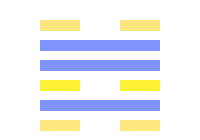
47.2.3.4.5 (47 > 15) - THE KHWĂN HEXAGRAM.
- 2. The second line, undivided, shows its subject straitened amidst his wine and viands. There come to him anon the red knee-covers (of the ruler). It will be well for him (to maintain his sincerity as) in sacrificing. Active operations (on his part) will lead to evil, but he will be free from blame.
- 3. The third line, divided, shows its subject straitened before a (frowning) rock. He lays hold of thorns. He enters his palace, and does not see his wife. There will be evil.
- 4. The fourth line, undivided, shows its subject proceeding very slowly (to help the subject of the first line), who is straitened by the carriage adorned with metal in front of him. There will be occasion for regret, but the end will be good.
- 5. The fifth line, undivided, shows its subject with his nose and feet cut off. He is straitened by (his ministers in their) scarlet aprons. He is leisurely in his movements, however, and is satisfied. It will be well for him to be (as sincere) as in sacrificing (to spiritual beings).
47.2.3.4.5 (47 > 15) - The embarrassment
One tries an experiment that endangers one's reputation.
Bing DeepL Google Yandex47.2.3.4.5 (47 > 15) - The embarrassment
One tries an experiment that endangers one's reputation.
Bing DeepL Google Yandex47.2.3.4.5 (47 > 15) - K’uán, la détresse
K’uán : détresse, abattement, dureté, sévérité, mauvais traitements.
- 2. Cet homme est dans la détresse quant au boire et au manger. Mais tout à coup apparaît la couverture rouge (du char du roi) (ou le secours), il est délivré, il pourra offrir des dons et sacrifices, il châtiera les méchants sans éprouver de dommage. [La ferme droiture est digne d’éloges. Com. II.] L’arrivée du roi ou des gens le sauve.
- 3. Serré contre un rocher, poignant (pour se soutenir) dans des buissons pleins de grosses épines, ou rentrant dans sa maison et n’y trouvant pas sa femme (enlevée par des brigands). [Cas douloureux, mauvaise fortune. Com. II.]
- 4. Autre cas). Homme avançant avec précaution, en détresse et quant à l’argent et quant à son char (qu’il a perdu) ; il est en grand danger d’être pris.
-
5. (Id.) Homme auquel on a entaillé le nez et les pieds, maltraité par les gens du peuple (les chemises rouges). [S’il sait encore rester ferme et digne, il pourra utilement offrir le sacrifice.
L’homme au nez entaillé figure celui qui échoue dans ses entreprises. S’il reste ferme dans la justice, il retrouvera le bonheur. Com. II.]
47.2.3.4.5 (47 > 15) - La gêne
On tente une expérience qui met en danger sa réputation.
Bing DeepL Google Yandex47.2.3.4.5 (47 > 15) - Kényelmetlenség
- 2. Nem vár semmit, amikor egy váratlan látogató lehetővé teszi hogy felülvizsgálja ítéleteit.
- 3. Elveszti az ítélőképességét, így meg kell kérnie azokat, akiket figyelmen kívül hagyott, hogy segítsenek.
- 4. Mielőtt másokhoz csatlakozna, meg kell felelnie jótevői igényeinek.
- 5. Hiteltelen, de ha megmutatja elkötelezettségét, hallgatni fognak rá.
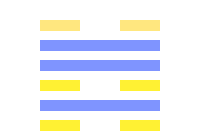
47.1.2.3.4.5 (47 > 36) - THE KHWĂN HEXAGRAM.
- 1. The first line, divided, shows its subject with bare buttocks straitened under the stump of a tree. He enters a dark valley, and for three years has no prospect (of deliverance).
- 2. The second line, undivided, shows its subject straitened amidst his wine and viands. There come to him anon the red knee-covers (of the ruler). It will be well for him (to maintain his sincerity as) in sacrificing. Active operations (on his part) will lead to evil, but he will be free from blame.
- 3. The third line, divided, shows its subject straitened before a (frowning) rock. He lays hold of thorns. He enters his palace, and does not see his wife. There will be evil.
- 4. The fourth line, undivided, shows its subject proceeding very slowly (to help the subject of the first line), who is straitened by the carriage adorned with metal in front of him. There will be occasion for regret, but the end will be good.
- 5. The fifth line, undivided, shows its subject with his nose and feet cut off. He is straitened by (his ministers in their) scarlet aprons. He is leisurely in his movements, however, and is satisfied. It will be well for him to be (as sincere) as in sacrificing (to spiritual beings).
47.1.2.3.4.5 (47 > 36) - The embarrassment
One lies on the ground when one cannot afford the slightest luxury.
Bing DeepL Google Yandex47.1.2.3.4.5 (47 > 36) - The embarrassment
One lies on the ground when one cannot afford the slightest luxury.
Bing DeepL Google Yandex47.1.2.3.4.5 (47 > 36) - K’uán, la détresse
K’uán : détresse, abattement, dureté, sévérité, mauvais traitements.
- 1. Un homme pressé contre le pied d’un arbre, poussé dans une caverne obscure, ne pouvant pendant très longtemps (litt. : 3 ans) voir personne à qui recourir.
- 2. Cet homme est dans la détresse quant au boire et au manger. Mais tout à coup apparaît la couverture rouge (du char du roi) (ou le secours), il est délivré, il pourra offrir des dons et sacrifices, il châtiera les méchants sans éprouver de dommage. [La ferme droiture est digne d’éloges. Com. II.] L’arrivée du roi ou des gens le sauve.
- 3. Serré contre un rocher, poignant (pour se soutenir) dans des buissons pleins de grosses épines, ou rentrant dans sa maison et n’y trouvant pas sa femme (enlevée par des brigands). [Cas douloureux, mauvaise fortune. Com. II.]
- 4. Autre cas). Homme avançant avec précaution, en détresse et quant à l’argent et quant à son char (qu’il a perdu) ; il est en grand danger d’être pris.
-
5. (Id.) Homme auquel on a entaillé le nez et les pieds, maltraité par les gens du peuple (les chemises rouges). [S’il sait encore rester ferme et digne, il pourra utilement offrir le sacrifice.
L’homme au nez entaillé figure celui qui échoue dans ses entreprises. S’il reste ferme dans la justice, il retrouvera le bonheur. Com. II.]
47.1.2.3.4.5 (47 > 36) - La gêne
On se couche par terre quand on ne peut pas s'offrir le moindre luxe.
Bing DeepL Google Yandex47.1.2.3.4.5 (47 > 36) - Kényelmetlenség
- 1. Felhagy az ügyeivel egy időre mert nem látni semmit.
- 2. Nem vár semmit, amikor egy váratlan látogató lehetővé teszi hogy felülvizsgálja ítéleteit.
- 3. Elveszti az ítélőképességét, így meg kell kérnie azokat, akiket figyelmen kívül hagyott, hogy segítsenek.
- 4. Mielőtt másokhoz csatlakozna, meg kell felelnie jótevői igényeinek.
- 5. Hiteltelen, de ha megmutatja elkötelezettségét, hallgatni fognak rá.

47.3.6 (47 > 44) - THE KHWĂN HEXAGRAM.
- 3. The third line, divided, shows its subject straitened before a (frowning) rock. He lays hold of thorns. He enters his palace, and does not see his wife. There will be evil.
- 6. The sixth line, divided, shows its subject straitened, as if bound with creepers ; or in a high and dangerous position, and saying (to himself), ‘If I move, I shall repent it.’ If he do repent of former errors, there will be good fortune in his going forward.
47.3.6 (47 > 44) - The embarrassment
One looks like one had a few too many drinks.
Bing DeepL Google Yandex47.3.6 (47 > 44) - The embarrassment
One looks like one had a few too many drinks.
Bing DeepL Google Yandex47.3.6 (47 > 44) - K’uán, la détresse
K’uán : détresse, abattement, dureté, sévérité, mauvais traitements.
- 3. Serré contre un rocher, poignant (pour se soutenir) dans des buissons pleins de grosses épines, ou rentrant dans sa maison et n’y trouvant pas sa femme (enlevée par des brigands). [Cas douloureux, mauvaise fortune. Com. II.]
- 6. Un homme en détresse, pris dans des buissons épais, sur une hauteur exposée aux dangers et qui se dit : si je bouge, je le paierai cher. [Quand on éprouve le repentir, on peut corriger le mal et alors on sera heureux. Com. II.].
47.3.6 (47 > 44) - Kényelmetlenség
- 3. Elveszti az ítélőképességét, így meg kell kérnie azokat, akiket figyelmen kívül hagyott, hogy segítsenek.
- 6. Nem akarja folytatni de sikeres lehet.
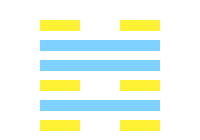
47.1.3.6 (47 > 1) - THE KHWĂN HEXAGRAM.
- 1. The first line, divided, shows its subject with bare buttocks straitened under the stump of a tree. He enters a dark valley, and for three years has no prospect (of deliverance).
- 3. The third line, divided, shows its subject straitened before a (frowning) rock. He lays hold of thorns. He enters his palace, and does not see his wife. There will be evil.
- 6. The sixth line, divided, shows its subject straitened, as if bound with creepers ; or in a high and dangerous position, and saying (to himself), ‘If I move, I shall repent it.’ If he do repent of former errors, there will be good fortune in his going forward.
47.1.3.6 (47 > 1) - K’uán, la détresse
K’uán : détresse, abattement, dureté, sévérité, mauvais traitements.
- 1. Un homme pressé contre le pied d’un arbre, poussé dans une caverne obscure, ne pouvant pendant très longtemps (litt. : 3 ans) voir personne à qui recourir.
- 3. Serré contre un rocher, poignant (pour se soutenir) dans des buissons pleins de grosses épines, ou rentrant dans sa maison et n’y trouvant pas sa femme (enlevée par des brigands). [Cas douloureux, mauvaise fortune. Com. II.]
- 6. Un homme en détresse, pris dans des buissons épais, sur une hauteur exposée aux dangers et qui se dit : si je bouge, je le paierai cher. [Quand on éprouve le repentir, on peut corriger le mal et alors on sera heureux. Com. II.].
47.1.3.6 (47 > 1) - Kényelmetlenség
- 1. Felhagy az ügyeivel egy időre mert nem látni semmit.
- 3. Elveszti az ítélőképességét, így meg kell kérnie azokat, akiket figyelmen kívül hagyott, hogy segítsenek.
- 6. Nem akarja folytatni de sikeres lehet.

47.2.3.6 (47 > 33) - THE KHWĂN HEXAGRAM.
- 2. The second line, undivided, shows its subject straitened amidst his wine and viands. There come to him anon the red knee-covers (of the ruler). It will be well for him (to maintain his sincerity as) in sacrificing. Active operations (on his part) will lead to evil, but he will be free from blame.
- 3. The third line, divided, shows its subject straitened before a (frowning) rock. He lays hold of thorns. He enters his palace, and does not see his wife. There will be evil.
- 6. The sixth line, divided, shows its subject straitened, as if bound with creepers ; or in a high and dangerous position, and saying (to himself), ‘If I move, I shall repent it.’ If he do repent of former errors, there will be good fortune in his going forward.
47.2.3.6 (47 > 33) - The embarrassment
One finds many similarities with a story that one already knows.
Bing DeepL Google Yandex47.2.3.6 (47 > 33) - The embarrassment
One finds many similarities with a story that one already knows.
Bing DeepL Google Yandex47.2.3.6 (47 > 33) - K’uán, la détresse
K’uán : détresse, abattement, dureté, sévérité, mauvais traitements.
- 2. Cet homme est dans la détresse quant au boire et au manger. Mais tout à coup apparaît la couverture rouge (du char du roi) (ou le secours), il est délivré, il pourra offrir des dons et sacrifices, il châtiera les méchants sans éprouver de dommage. [La ferme droiture est digne d’éloges. Com. II.] L’arrivée du roi ou des gens le sauve.
- 3. Serré contre un rocher, poignant (pour se soutenir) dans des buissons pleins de grosses épines, ou rentrant dans sa maison et n’y trouvant pas sa femme (enlevée par des brigands). [Cas douloureux, mauvaise fortune. Com. II.]
- 6. Un homme en détresse, pris dans des buissons épais, sur une hauteur exposée aux dangers et qui se dit : si je bouge, je le paierai cher. [Quand on éprouve le repentir, on peut corriger le mal et alors on sera heureux. Com. II.].
47.2.3.6 (47 > 33) - La gêne
On trouve bien des similitudes avec une histoire que l'on connaît déjà.
Bing DeepL Google Yandex47.2.3.6 (47 > 33) - Kényelmetlenség
- 2. Nem vár semmit, amikor egy váratlan látogató lehetővé teszi hogy felülvizsgálja ítéleteit.
- 3. Elveszti az ítélőképességét, így meg kell kérnie azokat, akiket figyelmen kívül hagyott, hogy segítsenek.
- 6. Nem akarja folytatni de sikeres lehet.

47.1.2.3.6 (47 > 13) - THE KHWĂN HEXAGRAM.
- 1. The first line, divided, shows its subject with bare buttocks straitened under the stump of a tree. He enters a dark valley, and for three years has no prospect (of deliverance).
- 2. The second line, undivided, shows its subject straitened amidst his wine and viands. There come to him anon the red knee-covers (of the ruler). It will be well for him (to maintain his sincerity as) in sacrificing. Active operations (on his part) will lead to evil, but he will be free from blame.
- 3. The third line, divided, shows its subject straitened before a (frowning) rock. He lays hold of thorns. He enters his palace, and does not see his wife. There will be evil.
- 6. The sixth line, divided, shows its subject straitened, as if bound with creepers ; or in a high and dangerous position, and saying (to himself), ‘If I move, I shall repent it.’ If he do repent of former errors, there will be good fortune in his going forward.
47.1.2.3.6 (47 > 13) - The embarrassment
One hopes to portray one's friends as family.
Bing DeepL Google Yandex47.1.2.3.6 (47 > 13) - The embarrassment
One hopes to portray one's friends as family.
Bing DeepL Google Yandex47.1.2.3.6 (47 > 13) - K’uán, la détresse
K’uán : détresse, abattement, dureté, sévérité, mauvais traitements.
- 1. Un homme pressé contre le pied d’un arbre, poussé dans une caverne obscure, ne pouvant pendant très longtemps (litt. : 3 ans) voir personne à qui recourir.
- 2. Cet homme est dans la détresse quant au boire et au manger. Mais tout à coup apparaît la couverture rouge (du char du roi) (ou le secours), il est délivré, il pourra offrir des dons et sacrifices, il châtiera les méchants sans éprouver de dommage. [La ferme droiture est digne d’éloges. Com. II.] L’arrivée du roi ou des gens le sauve.
- 3. Serré contre un rocher, poignant (pour se soutenir) dans des buissons pleins de grosses épines, ou rentrant dans sa maison et n’y trouvant pas sa femme (enlevée par des brigands). [Cas douloureux, mauvaise fortune. Com. II.]
- 6. Un homme en détresse, pris dans des buissons épais, sur une hauteur exposée aux dangers et qui se dit : si je bouge, je le paierai cher. [Quand on éprouve le repentir, on peut corriger le mal et alors on sera heureux. Com. II.].
47.1.2.3.6 (47 > 13) - La gêne
On a l'espoir de faire passer ses amis pour des proches.
Bing DeepL Google Yandex47.1.2.3.6 (47 > 13) - Kényelmetlenség
- 1. Felhagy az ügyeivel egy időre mert nem látni semmit.
- 2. Nem vár semmit, amikor egy váratlan látogató lehetővé teszi hogy felülvizsgálja ítéleteit.
- 3. Elveszti az ítélőképességét, így meg kell kérnie azokat, akiket figyelmen kívül hagyott, hogy segítsenek.
- 6. Nem akarja folytatni de sikeres lehet.

47.3.4.6 (47 > 57) - THE KHWĂN HEXAGRAM.
- 3. The third line, divided, shows its subject straitened before a (frowning) rock. He lays hold of thorns. He enters his palace, and does not see his wife. There will be evil.
- 4. The fourth line, undivided, shows its subject proceeding very slowly (to help the subject of the first line), who is straitened by the carriage adorned with metal in front of him. There will be occasion for regret, but the end will be good.
- 6. The sixth line, divided, shows its subject straitened, as if bound with creepers ; or in a high and dangerous position, and saying (to himself), ‘If I move, I shall repent it.’ If he do repent of former errors, there will be good fortune in his going forward.
47.3.4.6 (47 > 57) - The embarrassment
One brings together those one had wronged to do them justice.
Bing DeepL Google Yandex47.3.4.6 (47 > 57) - The embarrassment
One brings together those one had wronged to do them justice.
Bing DeepL Google Yandex47.3.4.6 (47 > 57) - K’uán, la détresse
K’uán : détresse, abattement, dureté, sévérité, mauvais traitements.
- 3. Serré contre un rocher, poignant (pour se soutenir) dans des buissons pleins de grosses épines, ou rentrant dans sa maison et n’y trouvant pas sa femme (enlevée par des brigands). [Cas douloureux, mauvaise fortune. Com. II.]
- 4. Autre cas). Homme avançant avec précaution, en détresse et quant à l’argent et quant à son char (qu’il a perdu) ; il est en grand danger d’être pris.
- 6. Un homme en détresse, pris dans des buissons épais, sur une hauteur exposée aux dangers et qui se dit : si je bouge, je le paierai cher. [Quand on éprouve le repentir, on peut corriger le mal et alors on sera heureux. Com. II.].
47.3.4.6 (47 > 57) - La gêne
On réunit ceux que l'on avait lésé pour leur rendre justice.
Bing DeepL Google Yandex47.3.4.6 (47 > 57) - Kényelmetlenség
- 3. Elveszti az ítélőképességét, így meg kell kérnie azokat, akiket figyelmen kívül hagyott, hogy segítsenek.
- 4. Mielőtt másokhoz csatlakozna, meg kell felelnie jótevői igényeinek.
- 6. Nem akarja folytatni de sikeres lehet.

47.1.3.4.6 (47 > 9) - THE KHWĂN HEXAGRAM.
- 1. The first line, divided, shows its subject with bare buttocks straitened under the stump of a tree. He enters a dark valley, and for three years has no prospect (of deliverance).
- 3. The third line, divided, shows its subject straitened before a (frowning) rock. He lays hold of thorns. He enters his palace, and does not see his wife. There will be evil.
- 4. The fourth line, undivided, shows its subject proceeding very slowly (to help the subject of the first line), who is straitened by the carriage adorned with metal in front of him. There will be occasion for regret, but the end will be good.
- 6. The sixth line, divided, shows its subject straitened, as if bound with creepers ; or in a high and dangerous position, and saying (to himself), ‘If I move, I shall repent it.’ If he do repent of former errors, there will be good fortune in his going forward.
47.1.3.4.6 (47 > 9) - The embarrassment
One shows others that one has nothing to hide.
Bing DeepL Google Yandex47.1.3.4.6 (47 > 9) - The embarrassment
One shows others that one has nothing to hide.
Bing DeepL Google Yandex47.1.3.4.6 (47 > 9) - K’uán, la détresse
K’uán : détresse, abattement, dureté, sévérité, mauvais traitements.
- 1. Un homme pressé contre le pied d’un arbre, poussé dans une caverne obscure, ne pouvant pendant très longtemps (litt. : 3 ans) voir personne à qui recourir.
- 3. Serré contre un rocher, poignant (pour se soutenir) dans des buissons pleins de grosses épines, ou rentrant dans sa maison et n’y trouvant pas sa femme (enlevée par des brigands). [Cas douloureux, mauvaise fortune. Com. II.]
- 4. Autre cas). Homme avançant avec précaution, en détresse et quant à l’argent et quant à son char (qu’il a perdu) ; il est en grand danger d’être pris.
- 6. Un homme en détresse, pris dans des buissons épais, sur une hauteur exposée aux dangers et qui se dit : si je bouge, je le paierai cher. [Quand on éprouve le repentir, on peut corriger le mal et alors on sera heureux. Com. II.].
47.1.3.4.6 (47 > 9) - La gêne
On montre aux autres que l'on n'a rien à cacher.
Bing DeepL Google Yandex47.1.3.4.6 (47 > 9) - Kényelmetlenség
- 1. Felhagy az ügyeivel egy időre mert nem látni semmit.
- 3. Elveszti az ítélőképességét, így meg kell kérnie azokat, akiket figyelmen kívül hagyott, hogy segítsenek.
- 4. Mielőtt másokhoz csatlakozna, meg kell felelnie jótevői igényeinek.
- 6. Nem akarja folytatni de sikeres lehet.

47.2.3.4.6 (47 > 53) - THE KHWĂN HEXAGRAM.
- 2. The second line, undivided, shows its subject straitened amidst his wine and viands. There come to him anon the red knee-covers (of the ruler). It will be well for him (to maintain his sincerity as) in sacrificing. Active operations (on his part) will lead to evil, but he will be free from blame.
- 3. The third line, divided, shows its subject straitened before a (frowning) rock. He lays hold of thorns. He enters his palace, and does not see his wife. There will be evil.
- 4. The fourth line, undivided, shows its subject proceeding very slowly (to help the subject of the first line), who is straitened by the carriage adorned with metal in front of him. There will be occasion for regret, but the end will be good.
- 6. The sixth line, divided, shows its subject straitened, as if bound with creepers ; or in a high and dangerous position, and saying (to himself), ‘If I move, I shall repent it.’ If he do repent of former errors, there will be good fortune in his going forward.
47.2.3.4.6 (47 > 53) - The embarrassment
One tries to make one's allies understand that they should not advance recklessly.
Bing DeepL Google Yandex47.2.3.4.6 (47 > 53) - The embarrassment
One tries to make one's allies understand that they should not advance recklessly.
Bing DeepL Google Yandex47.2.3.4.6 (47 > 53) - K’uán, la détresse
K’uán : détresse, abattement, dureté, sévérité, mauvais traitements.
- 2. Cet homme est dans la détresse quant au boire et au manger. Mais tout à coup apparaît la couverture rouge (du char du roi) (ou le secours), il est délivré, il pourra offrir des dons et sacrifices, il châtiera les méchants sans éprouver de dommage. [La ferme droiture est digne d’éloges. Com. II.] L’arrivée du roi ou des gens le sauve.
- 3. Serré contre un rocher, poignant (pour se soutenir) dans des buissons pleins de grosses épines, ou rentrant dans sa maison et n’y trouvant pas sa femme (enlevée par des brigands). [Cas douloureux, mauvaise fortune. Com. II.]
- 4. Autre cas). Homme avançant avec précaution, en détresse et quant à l’argent et quant à son char (qu’il a perdu) ; il est en grand danger d’être pris.
- 6. Un homme en détresse, pris dans des buissons épais, sur une hauteur exposée aux dangers et qui se dit : si je bouge, je le paierai cher. [Quand on éprouve le repentir, on peut corriger le mal et alors on sera heureux. Com. II.].
47.2.3.4.6 (47 > 53) - La gêne
On tente de faire comprendre à ses alliés qu'il ne faut pas s'avancer avec témérité.
Bing DeepL Google Yandex47.2.3.4.6 (47 > 53) - Kényelmetlenség
- 2. Nem vár semmit, amikor egy váratlan látogató lehetővé teszi hogy felülvizsgálja ítéleteit.
- 3. Elveszti az ítélőképességét, így meg kell kérnie azokat, akiket figyelmen kívül hagyott, hogy segítsenek.
- 4. Mielőtt másokhoz csatlakozna, meg kell felelnie jótevői igényeinek.
- 6. Nem akarja folytatni de sikeres lehet.

47.1.2.3.4.6 (47 > 37) - THE KHWĂN HEXAGRAM.
- 1. The first line, divided, shows its subject with bare buttocks straitened under the stump of a tree. He enters a dark valley, and for three years has no prospect (of deliverance).
- 2. The second line, undivided, shows its subject straitened amidst his wine and viands. There come to him anon the red knee-covers (of the ruler). It will be well for him (to maintain his sincerity as) in sacrificing. Active operations (on his part) will lead to evil, but he will be free from blame.
- 3. The third line, divided, shows its subject straitened before a (frowning) rock. He lays hold of thorns. He enters his palace, and does not see his wife. There will be evil.
- 4. The fourth line, undivided, shows its subject proceeding very slowly (to help the subject of the first line), who is straitened by the carriage adorned with metal in front of him. There will be occasion for regret, but the end will be good.
- 6. The sixth line, divided, shows its subject straitened, as if bound with creepers ; or in a high and dangerous position, and saying (to himself), ‘If I move, I shall repent it.’ If he do repent of former errors, there will be good fortune in his going forward.
47.1.2.3.4.6 (47 > 37) - The embarrassment
One has to finish one's studies before starting work.
Bing DeepL Google Yandex47.1.2.3.4.6 (47 > 37) - The embarrassment
One has to finish one's studies before starting work.
Bing DeepL Google Yandex47.1.2.3.4.6 (47 > 37) - K’uán, la détresse
K’uán : détresse, abattement, dureté, sévérité, mauvais traitements.
- 1. Un homme pressé contre le pied d’un arbre, poussé dans une caverne obscure, ne pouvant pendant très longtemps (litt. : 3 ans) voir personne à qui recourir.
- 2. Cet homme est dans la détresse quant au boire et au manger. Mais tout à coup apparaît la couverture rouge (du char du roi) (ou le secours), il est délivré, il pourra offrir des dons et sacrifices, il châtiera les méchants sans éprouver de dommage. [La ferme droiture est digne d’éloges. Com. II.] L’arrivée du roi ou des gens le sauve.
- 3. Serré contre un rocher, poignant (pour se soutenir) dans des buissons pleins de grosses épines, ou rentrant dans sa maison et n’y trouvant pas sa femme (enlevée par des brigands). [Cas douloureux, mauvaise fortune. Com. II.]
- 4. Autre cas). Homme avançant avec précaution, en détresse et quant à l’argent et quant à son char (qu’il a perdu) ; il est en grand danger d’être pris.
- 6. Un homme en détresse, pris dans des buissons épais, sur une hauteur exposée aux dangers et qui se dit : si je bouge, je le paierai cher. [Quand on éprouve le repentir, on peut corriger le mal et alors on sera heureux. Com. II.].
47.1.2.3.4.6 (47 > 37) - La gêne
On doit finir ses études avant de commencer son travail.
Bing DeepL Google Yandex47.1.2.3.4.6 (47 > 37) - Kényelmetlenség
- 1. Felhagy az ügyeivel egy időre mert nem látni semmit.
- 2. Nem vár semmit, amikor egy váratlan látogató lehetővé teszi hogy felülvizsgálja ítéleteit.
- 3. Elveszti az ítélőképességét, így meg kell kérnie azokat, akiket figyelmen kívül hagyott, hogy segítsenek.
- 4. Mielőtt másokhoz csatlakozna, meg kell felelnie jótevői igényeinek.
- 6. Nem akarja folytatni de sikeres lehet.

47.3.5.6 (47 > 50) - THE KHWĂN HEXAGRAM.
- 3. The third line, divided, shows its subject straitened before a (frowning) rock. He lays hold of thorns. He enters his palace, and does not see his wife. There will be evil.
- 5. The fifth line, undivided, shows its subject with his nose and feet cut off. He is straitened by (his ministers in their) scarlet aprons. He is leisurely in his movements, however, and is satisfied. It will be well for him to be (as sincere) as in sacrificing (to spiritual beings).
- 6. The sixth line, divided, shows its subject straitened, as if bound with creepers ; or in a high and dangerous position, and saying (to himself), ‘If I move, I shall repent it.’ If he do repent of former errors, there will be good fortune in his going forward.
47.3.5.6 (47 > 50) - The embarrassment
One only finds little explanation for the success of a lower-ranking person.
Bing DeepL Google Yandex47.3.5.6 (47 > 50) - The embarrassment
One only finds little explanation for the success of a lower-ranking person.
Bing DeepL Google Yandex47.3.5.6 (47 > 50) - K’uán, la détresse
K’uán : détresse, abattement, dureté, sévérité, mauvais traitements.
- 3. Serré contre un rocher, poignant (pour se soutenir) dans des buissons pleins de grosses épines, ou rentrant dans sa maison et n’y trouvant pas sa femme (enlevée par des brigands). [Cas douloureux, mauvaise fortune. Com. II.]
-
5. (Id.) Homme auquel on a entaillé le nez et les pieds, maltraité par les gens du peuple (les chemises rouges). [S’il sait encore rester ferme et digne, il pourra utilement offrir le sacrifice.
L’homme au nez entaillé figure celui qui échoue dans ses entreprises. S’il reste ferme dans la justice, il retrouvera le bonheur. Com. II.] - 6. Un homme en détresse, pris dans des buissons épais, sur une hauteur exposée aux dangers et qui se dit : si je bouge, je le paierai cher. [Quand on éprouve le repentir, on peut corriger le mal et alors on sera heureux. Com. II.].
47.3.5.6 (47 > 50) - La gêne
On ne trouve que peu d'explications quant à la réussite d'une personne de second plan.
Bing DeepL Google Yandex47.3.5.6 (47 > 50) - Kényelmetlenség
- 3. Elveszti az ítélőképességét, így meg kell kérnie azokat, akiket figyelmen kívül hagyott, hogy segítsenek.
- 5. Hiteltelen, de ha megmutatja elkötelezettségét, hallgatni fognak rá.
- 6. Nem akarja folytatni de sikeres lehet.

47.1.3.5.6 (47 > 14) - THE KHWĂN HEXAGRAM.
- 1. The first line, divided, shows its subject with bare buttocks straitened under the stump of a tree. He enters a dark valley, and for three years has no prospect (of deliverance).
- 3. The third line, divided, shows its subject straitened before a (frowning) rock. He lays hold of thorns. He enters his palace, and does not see his wife. There will be evil.
- 5. The fifth line, undivided, shows its subject with his nose and feet cut off. He is straitened by (his ministers in their) scarlet aprons. He is leisurely in his movements, however, and is satisfied. It will be well for him to be (as sincere) as in sacrificing (to spiritual beings).
- 6. The sixth line, divided, shows its subject straitened, as if bound with creepers ; or in a high and dangerous position, and saying (to himself), ‘If I move, I shall repent it.’ If he do repent of former errors, there will be good fortune in his going forward.
47.1.3.5.6 (47 > 14) - The embarrassment
One is presenting evidence that is not conclusive.
Bing DeepL Google Yandex47.1.3.5.6 (47 > 14) - The embarrassment
One is presenting evidence that is not conclusive.
Bing DeepL Google Yandex47.1.3.5.6 (47 > 14) - K’uán, la détresse
K’uán : détresse, abattement, dureté, sévérité, mauvais traitements.
- 1. Un homme pressé contre le pied d’un arbre, poussé dans une caverne obscure, ne pouvant pendant très longtemps (litt. : 3 ans) voir personne à qui recourir.
- 3. Serré contre un rocher, poignant (pour se soutenir) dans des buissons pleins de grosses épines, ou rentrant dans sa maison et n’y trouvant pas sa femme (enlevée par des brigands). [Cas douloureux, mauvaise fortune. Com. II.]
-
5. (Id.) Homme auquel on a entaillé le nez et les pieds, maltraité par les gens du peuple (les chemises rouges). [S’il sait encore rester ferme et digne, il pourra utilement offrir le sacrifice.
L’homme au nez entaillé figure celui qui échoue dans ses entreprises. S’il reste ferme dans la justice, il retrouvera le bonheur. Com. II.] - 6. Un homme en détresse, pris dans des buissons épais, sur une hauteur exposée aux dangers et qui se dit : si je bouge, je le paierai cher. [Quand on éprouve le repentir, on peut corriger le mal et alors on sera heureux. Com. II.].
47.1.3.5.6 (47 > 14) - La gêne
On présente des éléments qui n'ont rien de probant.
Bing DeepL Google Yandex47.1.3.5.6 (47 > 14) - Kényelmetlenség
- 1. Felhagy az ügyeivel egy időre mert nem látni semmit.
- 3. Elveszti az ítélőképességét, így meg kell kérnie azokat, akiket figyelmen kívül hagyott, hogy segítsenek.
- 5. Hiteltelen, de ha megmutatja elkötelezettségét, hallgatni fognak rá.
- 6. Nem akarja folytatni de sikeres lehet.
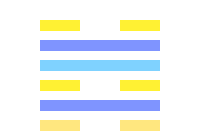
47.2.3.5.6 (47 > 56) - THE KHWĂN HEXAGRAM.
- 2. The second line, undivided, shows its subject straitened amidst his wine and viands. There come to him anon the red knee-covers (of the ruler). It will be well for him (to maintain his sincerity as) in sacrificing. Active operations (on his part) will lead to evil, but he will be free from blame.
- 3. The third line, divided, shows its subject straitened before a (frowning) rock. He lays hold of thorns. He enters his palace, and does not see his wife. There will be evil.
- 5. The fifth line, undivided, shows its subject with his nose and feet cut off. He is straitened by (his ministers in their) scarlet aprons. He is leisurely in his movements, however, and is satisfied. It will be well for him to be (as sincere) as in sacrificing (to spiritual beings).
- 6. The sixth line, divided, shows its subject straitened, as if bound with creepers ; or in a high and dangerous position, and saying (to himself), ‘If I move, I shall repent it.’ If he do repent of former errors, there will be good fortune in his going forward.
47.2.3.5.6 (47 > 56) - The embarrassment
One plants a tree to remember that one has been negligent towards nature.
Bing DeepL Google Yandex47.2.3.5.6 (47 > 56) - The embarrassment
One plants a tree to remember that one has been negligent towards nature.
Bing DeepL Google Yandex47.2.3.5.6 (47 > 56) - K’uán, la détresse
K’uán : détresse, abattement, dureté, sévérité, mauvais traitements.
- 2. Cet homme est dans la détresse quant au boire et au manger. Mais tout à coup apparaît la couverture rouge (du char du roi) (ou le secours), il est délivré, il pourra offrir des dons et sacrifices, il châtiera les méchants sans éprouver de dommage. [La ferme droiture est digne d’éloges. Com. II.] L’arrivée du roi ou des gens le sauve.
- 3. Serré contre un rocher, poignant (pour se soutenir) dans des buissons pleins de grosses épines, ou rentrant dans sa maison et n’y trouvant pas sa femme (enlevée par des brigands). [Cas douloureux, mauvaise fortune. Com. II.]
-
5. (Id.) Homme auquel on a entaillé le nez et les pieds, maltraité par les gens du peuple (les chemises rouges). [S’il sait encore rester ferme et digne, il pourra utilement offrir le sacrifice.
L’homme au nez entaillé figure celui qui échoue dans ses entreprises. S’il reste ferme dans la justice, il retrouvera le bonheur. Com. II.] - 6. Un homme en détresse, pris dans des buissons épais, sur une hauteur exposée aux dangers et qui se dit : si je bouge, je le paierai cher. [Quand on éprouve le repentir, on peut corriger le mal et alors on sera heureux. Com. II.].
47.2.3.5.6 (47 > 56) - La gêne
On plante un arbre pour se souvenir que l'on a été négligent envers la nature.
Bing DeepL Google Yandex47.2.3.5.6 (47 > 56) - Kényelmetlenség
- 2. Nem vár semmit, amikor egy váratlan látogató lehetővé teszi hogy felülvizsgálja ítéleteit.
- 3. Elveszti az ítélőképességét, így meg kell kérnie azokat, akiket figyelmen kívül hagyott, hogy segítsenek.
- 5. Hiteltelen, de ha megmutatja elkötelezettségét, hallgatni fognak rá.
- 6. Nem akarja folytatni de sikeres lehet.
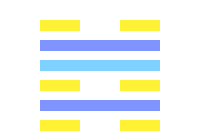
47.1.2.3.5.6 (47 > 30) - THE KHWĂN HEXAGRAM.
- 1. The first line, divided, shows its subject with bare buttocks straitened under the stump of a tree. He enters a dark valley, and for three years has no prospect (of deliverance).
- 2. The second line, undivided, shows its subject straitened amidst his wine and viands. There come to him anon the red knee-covers (of the ruler). It will be well for him (to maintain his sincerity as) in sacrificing. Active operations (on his part) will lead to evil, but he will be free from blame.
- 3. The third line, divided, shows its subject straitened before a (frowning) rock. He lays hold of thorns. He enters his palace, and does not see his wife. There will be evil.
- 5. The fifth line, undivided, shows its subject with his nose and feet cut off. He is straitened by (his ministers in their) scarlet aprons. He is leisurely in his movements, however, and is satisfied. It will be well for him to be (as sincere) as in sacrificing (to spiritual beings).
- 6. The sixth line, divided, shows its subject straitened, as if bound with creepers ; or in a high and dangerous position, and saying (to himself), ‘If I move, I shall repent it.’ If he do repent of former errors, there will be good fortune in his going forward.
47.1.2.3.5.6 (47 > 30) - The embarrassment
One takes refuge in the maternal womb to escape the troubles coming from the outside.
Bing DeepL Google Yandex47.1.2.3.5.6 (47 > 30) - The embarrassment
One takes refuge in the maternal womb to escape the troubles coming from the outside.
Bing DeepL Google Yandex47.1.2.3.5.6 (47 > 30) - K’uán, la détresse
K’uán : détresse, abattement, dureté, sévérité, mauvais traitements.
- 1. Un homme pressé contre le pied d’un arbre, poussé dans une caverne obscure, ne pouvant pendant très longtemps (litt. : 3 ans) voir personne à qui recourir.
- 2. Cet homme est dans la détresse quant au boire et au manger. Mais tout à coup apparaît la couverture rouge (du char du roi) (ou le secours), il est délivré, il pourra offrir des dons et sacrifices, il châtiera les méchants sans éprouver de dommage. [La ferme droiture est digne d’éloges. Com. II.] L’arrivée du roi ou des gens le sauve.
- 3. Serré contre un rocher, poignant (pour se soutenir) dans des buissons pleins de grosses épines, ou rentrant dans sa maison et n’y trouvant pas sa femme (enlevée par des brigands). [Cas douloureux, mauvaise fortune. Com. II.]
-
5. (Id.) Homme auquel on a entaillé le nez et les pieds, maltraité par les gens du peuple (les chemises rouges). [S’il sait encore rester ferme et digne, il pourra utilement offrir le sacrifice.
L’homme au nez entaillé figure celui qui échoue dans ses entreprises. S’il reste ferme dans la justice, il retrouvera le bonheur. Com. II.] - 6. Un homme en détresse, pris dans des buissons épais, sur une hauteur exposée aux dangers et qui se dit : si je bouge, je le paierai cher. [Quand on éprouve le repentir, on peut corriger le mal et alors on sera heureux. Com. II.].
47.1.2.3.5.6 (47 > 30) - La gêne
On se réfugie dans le giron maternel pour échapper aux ennuis venus de l'extérieur.
Bing DeepL Google Yandex47.1.2.3.5.6 (47 > 30) - Kényelmetlenség
- 1. Felhagy az ügyeivel egy időre mert nem látni semmit.
- 2. Nem vár semmit, amikor egy váratlan látogató lehetővé teszi hogy felülvizsgálja ítéleteit.
- 3. Elveszti az ítélőképességét, így meg kell kérnie azokat, akiket figyelmen kívül hagyott, hogy segítsenek.
- 5. Hiteltelen, de ha megmutatja elkötelezettségét, hallgatni fognak rá.
- 6. Nem akarja folytatni de sikeres lehet.

47.3.4.5.6 (47 > 18) - THE KHWĂN HEXAGRAM.
- 3. The third line, divided, shows its subject straitened before a (frowning) rock. He lays hold of thorns. He enters his palace, and does not see his wife. There will be evil.
- 4. The fourth line, undivided, shows its subject proceeding very slowly (to help the subject of the first line), who is straitened by the carriage adorned with metal in front of him. There will be occasion for regret, but the end will be good.
- 5. The fifth line, undivided, shows its subject with his nose and feet cut off. He is straitened by (his ministers in their) scarlet aprons. He is leisurely in his movements, however, and is satisfied. It will be well for him to be (as sincere) as in sacrificing (to spiritual beings).
- 6. The sixth line, divided, shows its subject straitened, as if bound with creepers ; or in a high and dangerous position, and saying (to himself), ‘If I move, I shall repent it.’ If he do repent of former errors, there will be good fortune in his going forward.
47.3.4.5.6 (47 > 18) - The embarrassment
One rarifies one's apparitions in order not to annoy those who follow them.
Bing DeepL Google Yandex47.3.4.5.6 (47 > 18) - The embarrassment
One rarifies one's apparitions in order not to annoy those who follow them.
Bing DeepL Google Yandex47.3.4.5.6 (47 > 18) - K’uán, la détresse
K’uán : détresse, abattement, dureté, sévérité, mauvais traitements.
- 3. Serré contre un rocher, poignant (pour se soutenir) dans des buissons pleins de grosses épines, ou rentrant dans sa maison et n’y trouvant pas sa femme (enlevée par des brigands). [Cas douloureux, mauvaise fortune. Com. II.]
- 4. Autre cas). Homme avançant avec précaution, en détresse et quant à l’argent et quant à son char (qu’il a perdu) ; il est en grand danger d’être pris.
-
5. (Id.) Homme auquel on a entaillé le nez et les pieds, maltraité par les gens du peuple (les chemises rouges). [S’il sait encore rester ferme et digne, il pourra utilement offrir le sacrifice.
L’homme au nez entaillé figure celui qui échoue dans ses entreprises. S’il reste ferme dans la justice, il retrouvera le bonheur. Com. II.] - 6. Un homme en détresse, pris dans des buissons épais, sur une hauteur exposée aux dangers et qui se dit : si je bouge, je le paierai cher. [Quand on éprouve le repentir, on peut corriger le mal et alors on sera heureux. Com. II.].
47.3.4.5.6 (47 > 18) - La gêne
On raréfie ses apparitions pour ne pas ennuyer ceux qui les suivent.
Bing DeepL Google Yandex47.3.4.5.6 (47 > 18) - Kényelmetlenség
- 3. Elveszti az ítélőképességét, így meg kell kérnie azokat, akiket figyelmen kívül hagyott, hogy segítsenek.
- 4. Mielőtt másokhoz csatlakozna, meg kell felelnie jótevői igényeinek.
- 5. Hiteltelen, de ha megmutatja elkötelezettségét, hallgatni fognak rá.
- 6. Nem akarja folytatni de sikeres lehet.

47.1.3.4.5.6 (47 > 26) - THE KHWĂN HEXAGRAM.
- 1. The first line, divided, shows its subject with bare buttocks straitened under the stump of a tree. He enters a dark valley, and for three years has no prospect (of deliverance).
- 3. The third line, divided, shows its subject straitened before a (frowning) rock. He lays hold of thorns. He enters his palace, and does not see his wife. There will be evil.
- 4. The fourth line, undivided, shows its subject proceeding very slowly (to help the subject of the first line), who is straitened by the carriage adorned with metal in front of him. There will be occasion for regret, but the end will be good.
- 5. The fifth line, undivided, shows its subject with his nose and feet cut off. He is straitened by (his ministers in their) scarlet aprons. He is leisurely in his movements, however, and is satisfied. It will be well for him to be (as sincere) as in sacrificing (to spiritual beings).
- 6. The sixth line, divided, shows its subject straitened, as if bound with creepers ; or in a high and dangerous position, and saying (to himself), ‘If I move, I shall repent it.’ If he do repent of former errors, there will be good fortune in his going forward.
47.1.3.4.5.6 (47 > 26) - The embarrassment
One displays a disarming serenity in the middle of a field of ruins.
Bing DeepL Google Yandex47.1.3.4.5.6 (47 > 26) - The embarrassment
One displays a disarming serenity in the middle of a field of ruins.
Bing DeepL Google Yandex47.1.3.4.5.6 (47 > 26) - K’uán, la détresse
K’uán : détresse, abattement, dureté, sévérité, mauvais traitements.
- 1. Un homme pressé contre le pied d’un arbre, poussé dans une caverne obscure, ne pouvant pendant très longtemps (litt. : 3 ans) voir personne à qui recourir.
- 3. Serré contre un rocher, poignant (pour se soutenir) dans des buissons pleins de grosses épines, ou rentrant dans sa maison et n’y trouvant pas sa femme (enlevée par des brigands). [Cas douloureux, mauvaise fortune. Com. II.]
- 4. Autre cas). Homme avançant avec précaution, en détresse et quant à l’argent et quant à son char (qu’il a perdu) ; il est en grand danger d’être pris.
-
5. (Id.) Homme auquel on a entaillé le nez et les pieds, maltraité par les gens du peuple (les chemises rouges). [S’il sait encore rester ferme et digne, il pourra utilement offrir le sacrifice.
L’homme au nez entaillé figure celui qui échoue dans ses entreprises. S’il reste ferme dans la justice, il retrouvera le bonheur. Com. II.] - 6. Un homme en détresse, pris dans des buissons épais, sur une hauteur exposée aux dangers et qui se dit : si je bouge, je le paierai cher. [Quand on éprouve le repentir, on peut corriger le mal et alors on sera heureux. Com. II.].
47.1.3.4.5.6 (47 > 26) - La gêne
On affiche une sérénité désarmante au milieu d'un champ de ruines.
Bing DeepL Google Yandex47.1.3.4.5.6 (47 > 26) - Kényelmetlenség
- 1. Felhagy az ügyeivel egy időre mert nem látni semmit.
- 3. Elveszti az ítélőképességét, így meg kell kérnie azokat, akiket figyelmen kívül hagyott, hogy segítsenek.
- 4. Mielőtt másokhoz csatlakozna, meg kell felelnie jótevői igényeinek.
- 5. Hiteltelen, de ha megmutatja elkötelezettségét, hallgatni fognak rá.
- 6. Nem akarja folytatni de sikeres lehet.
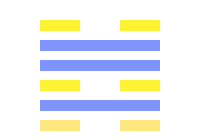
47.2.3.4.5.6 (47 > 52) - THE KHWĂN HEXAGRAM.
- 2. The second line, undivided, shows its subject straitened amidst his wine and viands. There come to him anon the red knee-covers (of the ruler). It will be well for him (to maintain his sincerity as) in sacrificing. Active operations (on his part) will lead to evil, but he will be free from blame.
- 3. The third line, divided, shows its subject straitened before a (frowning) rock. He lays hold of thorns. He enters his palace, and does not see his wife. There will be evil.
- 4. The fourth line, undivided, shows its subject proceeding very slowly (to help the subject of the first line), who is straitened by the carriage adorned with metal in front of him. There will be occasion for regret, but the end will be good.
- 5. The fifth line, undivided, shows its subject with his nose and feet cut off. He is straitened by (his ministers in their) scarlet aprons. He is leisurely in his movements, however, and is satisfied. It will be well for him to be (as sincere) as in sacrificing (to spiritual beings).
- 6. The sixth line, divided, shows its subject straitened, as if bound with creepers ; or in a high and dangerous position, and saying (to himself), ‘If I move, I shall repent it.’ If he do repent of former errors, there will be good fortune in his going forward.
47.2.3.4.5.6 (47 > 52) - The embarrassment
One is busy doing as usual so that no one notices what has changed.
Bing DeepL Google Yandex47.2.3.4.5.6 (47 > 52) - The embarrassment
One is busy doing as usual so that no one notices what has changed.
Bing DeepL Google Yandex47.2.3.4.5.6 (47 > 52) - K’uán, la détresse
K’uán : détresse, abattement, dureté, sévérité, mauvais traitements.
- 2. Cet homme est dans la détresse quant au boire et au manger. Mais tout à coup apparaît la couverture rouge (du char du roi) (ou le secours), il est délivré, il pourra offrir des dons et sacrifices, il châtiera les méchants sans éprouver de dommage. [La ferme droiture est digne d’éloges. Com. II.] L’arrivée du roi ou des gens le sauve.
- 3. Serré contre un rocher, poignant (pour se soutenir) dans des buissons pleins de grosses épines, ou rentrant dans sa maison et n’y trouvant pas sa femme (enlevée par des brigands). [Cas douloureux, mauvaise fortune. Com. II.]
- 4. Autre cas). Homme avançant avec précaution, en détresse et quant à l’argent et quant à son char (qu’il a perdu) ; il est en grand danger d’être pris.
-
5. (Id.) Homme auquel on a entaillé le nez et les pieds, maltraité par les gens du peuple (les chemises rouges). [S’il sait encore rester ferme et digne, il pourra utilement offrir le sacrifice.
L’homme au nez entaillé figure celui qui échoue dans ses entreprises. S’il reste ferme dans la justice, il retrouvera le bonheur. Com. II.] - 6. Un homme en détresse, pris dans des buissons épais, sur une hauteur exposée aux dangers et qui se dit : si je bouge, je le paierai cher. [Quand on éprouve le repentir, on peut corriger le mal et alors on sera heureux. Com. II.].
47.2.3.4.5.6 (47 > 52) - La gêne
On s'occupe de faire comme d'habitude pour que personne ne remarque ce qui a changé.
Bing DeepL Google Yandex47.2.3.4.5.6 (47 > 52) - Kényelmetlenség
- 2. Nem vár semmit, amikor egy váratlan látogató lehetővé teszi hogy felülvizsgálja ítéleteit.
- 3. Elveszti az ítélőképességét, így meg kell kérnie azokat, akiket figyelmen kívül hagyott, hogy segítsenek.
- 4. Mielőtt másokhoz csatlakozna, meg kell felelnie jótevői igényeinek.
- 5. Hiteltelen, de ha megmutatja elkötelezettségét, hallgatni fognak rá.
- 6. Nem akarja folytatni de sikeres lehet.
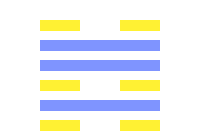
47.1.2.3.4.5.6 (47 > 22) - THE KHWĂN HEXAGRAM.
- 1. The first line, divided, shows its subject with bare buttocks straitened under the stump of a tree. He enters a dark valley, and for three years has no prospect (of deliverance).
- 2. The second line, undivided, shows its subject straitened amidst his wine and viands. There come to him anon the red knee-covers (of the ruler). It will be well for him (to maintain his sincerity as) in sacrificing. Active operations (on his part) will lead to evil, but he will be free from blame.
- 3. The third line, divided, shows its subject straitened before a (frowning) rock. He lays hold of thorns. He enters his palace, and does not see his wife. There will be evil.
- 4. The fourth line, undivided, shows its subject proceeding very slowly (to help the subject of the first line), who is straitened by the carriage adorned with metal in front of him. There will be occasion for regret, but the end will be good.
- 5. The fifth line, undivided, shows its subject with his nose and feet cut off. He is straitened by (his ministers in their) scarlet aprons. He is leisurely in his movements, however, and is satisfied. It will be well for him to be (as sincere) as in sacrificing (to spiritual beings).
- 6. The sixth line, divided, shows its subject straitened, as if bound with creepers ; or in a high and dangerous position, and saying (to himself), ‘If I move, I shall repent it.’ If he do repent of former errors, there will be good fortune in his going forward.
47.1.2.3.4.5.6 (47 > 22) - The embarrassment
One makes efforts so that others understand the importance of one's commitment.
47.1.2.3.4.5.6 (47 > 22) - The embarrassment
One makes efforts so that others understand the importance of one's commitment.
47.1.2.3.4.5.6 (47 > 22) - K’uán, la détresse
K’uán : détresse, abattement, dureté, sévérité, mauvais traitements.
- 1. Un homme pressé contre le pied d’un arbre, poussé dans une caverne obscure, ne pouvant pendant très longtemps (litt. : 3 ans) voir personne à qui recourir.
- 2. Cet homme est dans la détresse quant au boire et au manger. Mais tout à coup apparaît la couverture rouge (du char du roi) (ou le secours), il est délivré, il pourra offrir des dons et sacrifices, il châtiera les méchants sans éprouver de dommage. [La ferme droiture est digne d’éloges. Com. II.] L’arrivée du roi ou des gens le sauve.
- 3. Serré contre un rocher, poignant (pour se soutenir) dans des buissons pleins de grosses épines, ou rentrant dans sa maison et n’y trouvant pas sa femme (enlevée par des brigands). [Cas douloureux, mauvaise fortune. Com. II.]
- 4. Autre cas). Homme avançant avec précaution, en détresse et quant à l’argent et quant à son char (qu’il a perdu) ; il est en grand danger d’être pris.
-
5. (Id.) Homme auquel on a entaillé le nez et les pieds, maltraité par les gens du peuple (les chemises rouges). [S’il sait encore rester ferme et digne, il pourra utilement offrir le sacrifice.
L’homme au nez entaillé figure celui qui échoue dans ses entreprises. S’il reste ferme dans la justice, il retrouvera le bonheur. Com. II.] - 6. Un homme en détresse, pris dans des buissons épais, sur une hauteur exposée aux dangers et qui se dit : si je bouge, je le paierai cher. [Quand on éprouve le repentir, on peut corriger le mal et alors on sera heureux. Com. II.].
47.1.2.3.4.5.6 (47 > 22) - La gêne
On fait des efforts pour que les autres comprennent l'importance de son engagement.
Bing DeepL Google Yandex47.1.2.3.4.5.6 (47 > 22) - Kényelmetlenség
- 1. Felhagy az ügyeivel egy időre mert nem látni semmit.
- 2. Nem vár semmit, amikor egy váratlan látogató lehetővé teszi hogy felülvizsgálja ítéleteit.
- 3. Elveszti az ítélőképességét, így meg kell kérnie azokat, akiket figyelmen kívül hagyott, hogy segítsenek.
- 4. Mielőtt másokhoz csatlakozna, meg kell felelnie jótevői igényeinek.
- 5. Hiteltelen, de ha megmutatja elkötelezettségét, hallgatni fognak rá.
- 6. Nem akarja folytatni de sikeres lehet.

